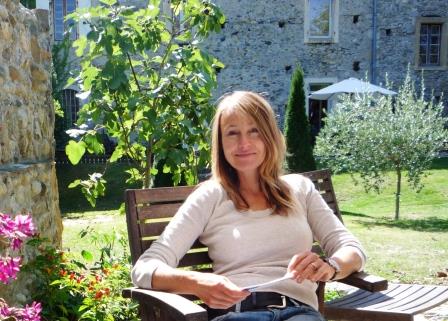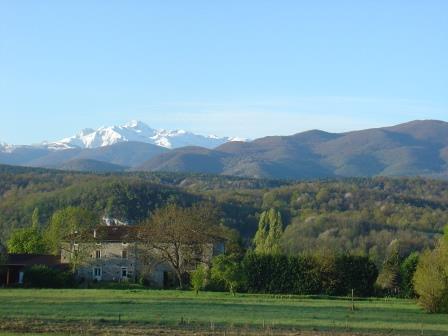From England to Ariège: Foothills of France

1. Why did you move abroad?
Because we could; I was a freelance writer and could work from anywhere as could my husband. Our children were still young enough to adapt to pretty much anything we could throw at them but we knew that, the older they got, the harder it would get to move them. Hence, we decided it was now or never to sell the house and try out a foreign lifestyle for while.
I would like to say that we then did copious amounts of research before we decided whereabouts in France to stick our pin – but I would be lying. We actually put our house on the market, accepted an offer, put most of our belongings in storage, packed up two cars with our suitcases, the three children and our long-suffering black Labrador and headed off in convoy to the ferry for a new life in France and then muddled through to where we are now.
2. How do you make a living?
Four years ago I set up Foothills of France, my own registered property finding company here in France, as part of the FrenchPropertyFinder network because I realised how difficult it is to find a property in this region if you are not on the spot to hear of private sales or to regularly go in and hassle the agents and if you don’t speak the language. Agents here are really behind the times; some don’t have websites and even the ones that do, rarely update them. French estate agents also work differently to English estate agents and are not interested in taking your details in order to send you suitable properties to consider as they come on the market. They expect you to visit them and then will show you what they have available on their books at that time; a very frustrating and time-consuming business. Plus, in France, the agents will not give you any details of the location of the property meaning that you can’t, as we have always done in the UK, do a drive past to have a sneaky peak at the house to see whether it is worth your while arranging an appointment for a formal viewing. Here the agent’s details only contain the most basic facts, so it is impossible to tell what a house is really like - let alone whether it’s located near a noisy road, dog kennels or rubbish dump.
So I now spend my time finding dream properties for clients from all over the world. I do all the time-consuming initial trawling thorough property details, then visit all possibilities before drawing up a short list of houses that meet my client’s needs exactly, complete with photographs and in-depth description so that they do not waste valuable time and money viewing properties that turn out to be completely unsuitable.
I work for private clients, with the aim of finding them their dream home but, unlike many similar property search agents in the UK, I work with all budgets from 50,000 Euros upwards. This is a new industry in France and not much understood as yet but it is a much needed service and growing fast.
3. How often do you communicate with home and how?
Thanks to the internet, communication with family and friends is easy and cheap. I am in email contact regularly and we also use Skype but we also encourage visitors so that we can catch up properly. If anything I would say that we probably get to spend more quality time with friends and family than we did when we were in the UK.
4. What's your favorite thing about being an expat in France?
I do believe it is true that the quality of life here in France is better in general than in the UK; the schools, the healthcare, the food and wine and the community spirit are all fantastic. There is practically no crime (except terrible driving), our children are bilingual and completely free range and that is before we even get on to the advantages of the climate; we spend most of our time outdoors, we get to cycle along the valleys, swim in the clear rivers and have easy access to the mountains for walking and skiing. We shop for fantastic fresh produce in the local markets, eat outside half of the year, plus we are surrounded by fabulous views whichever way we turn. I really enjoy being immersed in a different culture and I think we have all really benefited from understanding how other people live.
I also love the freedom to be eccentric - we definitely get away with more because we are foreign and so don’t necessarily know the right way to go about things so I think people are more understanding and indulgent of our behaviour and mistakes than they would be of a French person.
5. What’s the worst thing about being an expat in France?
Well the bureaucracy and paperwork is as bad as everyone says, especially when you are trying to run a business. And I find the lack of shared history and common interests difficult with French friends because I love books and films and these are not something people here generally have in common. I also wish my French was good enough to discuss serious subjects in depth - I still feel (and probably sound) like a seven year old when trying to talk about politics or world economics.
6. What do you miss most?
Being close to family and friends and not being able to see them at the drop of a hat. I did miss the radio in the car but now I can listen to podcasts which is even better; technology really has taken away most of the downsides of being an expat.
7. What did you do to meet people and integrate in your new home?
A couple of weeks after we moved in, we invited everyone in our hamlet (about 15 families) to come over for an aperitif. We made up a huge bowl of Pimms and lots of food and then waited, wondering if anyone would turn up. In fact, every single person did (all fascinated to see these strange Brits who had landed in their midst).
Initially they were all a bit wary of the Pimms but, after a while, decided it was harmless and started knocking it back at such a rate that we ran out of lemonade and so it got stronger and stronger until everyone was much the worse for wear. It was a perfect way to break the ice and we are on first name terms and good friends with all our neighbours who can never do enough to help us. It is a really strong community here and we feel very lucky and privileged to be part of it.
8. What custom/ habits do you find most strange about your adopted culture?
The fact that the French can’t get out of bed early on weekends or holidays which turns out to be great because we always know that we will have the ski slopes or beach to ourselves from 9am - 11am and then again from 12-2pm when they are all in the restaurants. It took ages to get to grips with having to eat in restaurants at such set hours or not at all and nothing being open on a Sunday but now we love it; there’s much more emphasis on the good things in life and on family time together. It also took a while to remember to say bonjour to everyone on entering a shop or bakery and au revoir on leaving but now I find it only normal and polite and find myself doing the same thing on trips back to the UK which gets me some very odd looks.
9. What is a myth about your adopted country?
That they don’t work long hours - all the people we know here work incredibly long hours, usually starting at 8am and finishing at 7pm. Our son just did work experience at our local patisserie/chocolaterie and there they began work at 4am and finished at 1pm without taking a break. Of course, there are some public sector jobs which have very short hours but this is definitely not the norm around here.
10. Is the cost of living higher or lower than the last country you lived in and how has that made a difference in your life?
That depends; some things are more expensive here and other things are less expensive. I would say that, in general, the food here is local, seasonal and organic but also more expensive than the UK so we live better, eat more healthily but are more careful and selective about what we eat. Wine is definitely less expensive as is petrol and diesel and anything to do with cars and servicing (although we do have a particularly fantastic mechanic so that might not be country-wide.) Skiing is much cheaper here - we can often get a ski pass for under 20 Euros and a meal on the slopes doesn’t cost any more than it does in town, unlike in the Alps. Health care is more expensive but much better and, of course, houses are much better value although I think many Brits have an unrealistic expectation of what they can get for their budget here - houses are cheaper but you can’t expect to pick up a beautiful, stone house for next to nothing unless it needs serious amounts of work doing to it.
11. What advice would you give other expats?
Relax into the way of life and accept that you are in someone else’s country and hence should respect their way of life and traditions. We have found the locals generally very friendly and welcoming but you are a stranger in their country and must expect to do things their way even if you don’t like it - and you might even get to like it and learn something both about the country and about yourself.
12. When and why did you start your blog?
I started my blog when I set up Foothills of France, my property search agency because I knew that there was a real lack of information not just for house hunters looking to buy in France but for people wanting to understand the way of life here and how they can best integrate and get the most out of their adopted country. So although I cover lots of subjects to do with property, I also talk about life in general, school, traditions and the experience of being a foreigner abroad.
 Nadia's
Blog, Foothills of France
Nadia's
Blog, Foothills of France
 Find out more about being an expat in France with Easy Expat's
Find out more about being an expat in France with Easy Expat's
Guide to Paris
To be considered for an interview (as well as other articles), add your blog to BlogExpat!
Part of the EasyExpat.com adventure since 2008. Drink, Travel, Write
